- Home
- Alex Scarrow
Plague Land Series Book 1 Page 2
Plague Land Series Book 1 Read online
Page 2
Then he spotted another news item at the bottom of the page: Quarantine…and some place he’d never heard of.
Sam hit a link, and in a flash, the page changed to the ForTel homepage.
“Wait!” said Leon. “Can you go back?”
“Sure.” Sam sighed and went back to the Reuters page. Leon looked for the small headline, but it wasn’t there anymore; the page layout was different, displaying a new page of news stories.
“Crap, it’s gone.”
“What are you looking for?”
Leon shook his head. “Never mind. It was something to do with a… I don’t know, just…”
Sam patted him on the back. “You OK, Leon?”
Chapter 4
Ionian Sea, off the West Coast of Greece
Commander Benito Arnoni stood at the prow of the Levriero with a line ready to throw. The pilot cut the engines of the Guardia di Finanza motorboat as it closed the last sixty feet of choppy water.
The boat before them was one of the usual repurposed fishing vessels used by migrant traffickers, stripped of fishing lines and apparatus to make maximum use of the deck space. The vessel had first been spotted an hour ago, and Arnoni’s patrol boat had been hastily dispatched to intercept it.
Even as a dot on the horizon, it hadn’t looked quite right. Closer to it now, it looked decidedly wrong. No waving arms, no rows of malnourished faces, no painfully thin and terrified stick figures braced against each other to keep their balance as the boat bobbed and rocked on the water.
It looked utterly deserted. Arnoni had no one to toss a line to.
Their motorboat slowly approached the deserted vessel and Arnoni, standing at the prow, stretched and craned his neck to get a better look across its empty deck. No bodies to be seen, but the boat looked oddly decorated. Ribbons of bright pink, like streamers, were draped across the rusty, paint-flecked deck. Some of those streamers were wound up the side of the bridge, up the support stanchions, to a radio antenna where a large, pink streamer flared out and fluttered like a pennant. For a moment, Arnoni wondered if this boat was someone’s idea of a joke or a publicity stunt. Maybe some concept artist’s idea of meaningful “art.” Crimson and sepia paint seemed to have been spattered everywhere, as if the artist wasn’t quite satisfied that his ribbons were enough of a creative statement.
As the prow of his ship bumped against the front of the boat, Arnoni threw a leg over the safety rail and hopped across, onto its foredeck.
The first thing that hit him was the stench—a sickeningly sweet yet cheesy smell that reminded him of hanging joints of salted ham.
And no, they certainly weren’t party streamers or decorative ribbons. He hunkered down and inspected the pink webbing more closely. It glistened wetly.
“Merda.”
The boat looked like a slaughterhouse, as if the contents of the building had been dumped on the boat from high above. Now he knew what he was smelling: the putrid, sickly sweet odor of rotting flesh. He covered his nose and mouth as he made his way down the side of the boat, shuffling along the narrow space, past the bridge, toward the open cockpit and the aft deck. A low, green canvas awning spread over the bow of the vessel rustled and snapped in the breeze. He took a deep breath through his mouth, steadying his nerves, his stomach, knowing, sensing, that there was more to see beneath it.
He ducked down under the awning.
“Gesú Cristo!” He crossed himself. His first thought was that he was staring at the handiwork of the devil himself, some barbaric, playful, diorama ingeniously constructed from the parts of humankind.
Commander Benito Arnoni threw up…and just over an hour later, he was dead too.
Chapter 5
School finished for Leon at two o’clock. There was a key skills class he was supposed to attend, taking him to 3:00 p.m., but he decided to skip it. He went to his locker and retrieved the gym bag. The clothes inside were all convincingly damp and muddy. He’d take them home tonight and give them to his mom to throw into the washing machine, and she’d dutifully ask him how the soccer game after school went. He’d tell her it went well, that sure, he was making friends. That the guys were, like, all totally cool. She’d smile as she stuffed his clothes in the washing machine and then get back to thinking about work, about herself, thinking about how her children’s father had messed up all their lives so completely.
Leon’s plan had worked twice so far. He took his gym clothes and tennis shoes to school, dragged them through a mud puddle, let them sit damp for a few days, then brought them home and told his mom he’d had fun kicking a ball around with the other lads.
Now he made his way through Hammersmith toward Grace’s school, a secondary school that looked like a high-security prison from the outside, its small playground fenced high and topped off with wire. Leon’s mom insisted he meet Grace right at the school gates, so she didn’t have to walk home on her own. There had been a girl at another school nearby who’d been assaulted by a gang. That had happened a few weeks after they’d arrived from the U.S. and settled into their apartment.
Maybe when she was a little bit older, Grace could make her own way home but not yet, and not with her broken arm.
Her school finished at three thirty. Leon had some time to wander through King’s Mall. He hung out here on Wednesdays and Fridays (when he was supposedly playing soccer). It was warm and dry, and he could usually make his hot chocolate from Starbucks last for a long time as he stared at the passersby.
He walked past a shop window flickering with the same image across a dozen widescreen plasma TVs: a reporter, and behind him, what looked like someone’s cell phone video, pixelated and blurred. Leon could make out what looked like discarded piles of clothes left in the middle of some dusty street. He quickly realized they were bodies, dozens of them, scattered about randomly. The video lasted only a few seconds and then looped. Across the bottom of the various TV screens, a headline scrolled.
Unidentified viral outbreak in Nigeria
He wondered if this had something to do with the sound bite that had caught his attention this morning over breakfast. He looked around, expecting to see others beginning to gather to stare at the screens, but the mall was busy with people who had far less time on their hands than he, certainly not enough to hang around watching TV through a shop window.
He watched for another couple of minutes, until a commercial break came on. And then he realized he’d better get a move on to pick up Grace.
• • •
“I’m worried about you, Leo.”
“I’m fine, Grace,” he replied.
“No. You’re not. You don’t have any friends. You spend too much time on your own.”
“Jeez. What are you, my mother?”
Grace shrugged as she walked beside him, small and slight at half her brother’s height. He took her pink schoolbag and slung it over his shoulder while she adjusted her sling.
“You can be really immature sometimes, Leo. Somebody’s got to look out for you.”
Grace was doing far better than him with the sudden move to London. She’d already been invited to several birthday parties, and from the snatches of chitchat he’d listened to while she was on her phone, she sounded as if she was already well on the way up her school’s social food chain.
It seemed the whole exotic-accent thing was working in her favor, and of course, she played on it, hamming it up so much so that she sounded like some precocious Beverly Hills princess. Even before the move, back in New Jersey, she had been popular—queen of the playground, a member of every after-school club.
She placed a hand on his arm and looked up at him. “You’re missing Dad, aren’t you?”
“Dunno, a little…maybe.”
“Don’t! He was a complete jerk, cheating on Mom like that!”
Leon wasn’t so sure it was that one-sided. Yeah, he’d had a thing
with someone at work. But his mom wasn’t entirely blameless. She pecked at him all the time, always seemed to have something to complain about, to blame him for, whether it was slippers in the hall, shaving brush in the sink, oversalting the dinner she’d slaved over, or staying late at work far too often. Leon had overheard his dad call her a “bitter little shrew” once and wondered why on earth they bothered putting up with each other.
“It takes two to screw up like they did.”
“Men!” Grace grumbled.
Leon smiled. Grace tried to sound like a grown-up, but most of the time she sounded like one of those precocious child actors who talked about inner dialogue and character motivation.
Leon shook his head. “Jesus, Grace, why can’t you just be like every other girl your age and just play with, I dunno…dolls or something?”
She sighed wearily. “Play is for children.”
They walked on in silence for a while, weaving their way along the increasingly busy sidewalk that was filling up with early commuters and the tail end of kids going home from school.
“Anyway, it’s you we’re talking about.”
“Yes, Mom.”
She tossed her curly, dark hair and jutted her chin out. “You’ve got to make much more of an effort, Leon. Mom’s stressed out enough as it is.” Mom. Grace was hanging on to her accent as if it were a gift, whereas Leon had been doing his best to bury it.
“She doesn’t need to be worrying about you being some weirdo loner as well.”
“I’ve got friends, OK?”
“So, how come they never call or come around?”
Jeez. Gimme a break. “Because I value my personal space. That’s not a frickin crime, is it?”
Grace looked up at him, smiling with pity. “Just try a little harder, OK?”
Pity? From a twelve-year-old!?
“I’m fine, Grace. Can we just leave my social life out of it?”
They walked past a convenience store, and she stopped suddenly. “OhmyGod!”
“What?”
“I need to buy a paper! They’re printing coupons for free Maybelline samplers all this week.” She headed for the open door. “I miss a coupon, I lose out. Wait here.”
Leon nodded obediently, watching his sister stride inside—so small for her age, with drainpipe arms and legs and knobby knees, her long, dark curls held tidily back from her face by a headband…and so annoyingly precocious. Even as a baby she’d been protective of Leon, patting him affectionately on the nose as she sucked on a bottle of milk.
Among the halal meat hanging in the shop window, he saw handwritten ads taped to the glass. Beneath the awning, the afternoon edition of the Evening Standard sat on a rain-damp rack, a tall headline spread across the entire front page.
MYSTERY VIRUS IN WEST AFRICA
He took a couple of steps closer to the window to read the story underneath.
“…an as yet unidentified virus has turned up today in several other isolated villages in Nigeria, Cameroon, and Ghana. The World Health Organization has already dispatched a scramble team to the three locations where symptoms have been reported. We understand that personnel from the United States military’s medical research division, USAMRIID, have also been sent. So far neither organization has commented on the nature of the virus, although some eyewitness accounts from within the affected villages have talked of extensive hemorrhaging and external bleeding, symptoms similar to those of Ebola.”
Grace came out of the shop, leafing through the paper in search of her coupon page.
“You seen this?” asked Leon, pointing to the newspaper rack.
She momentarily cocked an eyebrow at the headline before returning to her own paper. “Oh, you worry way too much. It’ll be another false alarm.”
She led the way up the busy street. Leon cast one last glance back at the window before following her.
Chapter 6
Amoso, West Africa
Dr. Kenneth Jones leaned over in his seat to look out of the window. Below, the small town of Amoso was barely visible in the night. There were no streetlamps on, although one or two buildings were showing lights, presumably powered by portable generators. He could see several oil-drum fires scattered across the area, but apart from that, it looked like a ghost town; there was nothing going on down there—no cars on the roads, no pedestrians.
“I can’t see anything moving,” he said into his throat mike.
The helicopter’s beam played steadily across the narrow streets, picking out the flat, corrugated steel rooftops encrusted with antennas and satellite dishes.
Jones spotted something pale flicker into the intense beam of light and out of it again. And then in…
It was just…a plastic bag stirred up by the downdraft of the helicopter.
Dr. Gupta leaned forward to take a look. The helmet of his containment suit clunked awkwardly against the window.
Above the deafening drone of the helicopter, Jones heard Gupta’s voice over his headphones. “Dammit. I can’t see anything clearly in here. These UN-issue suits are too bulky.”
Jones nodded. He hated them. They were incredibly cumbersome and stifling. He was just managing to hold in check a suffocating sense of claustrophobia. The sooner they were done getting a sample back to their hastily assembled UN ops center, then hosed down three separate times and out of these damn suits, the better.
“Are we safe to go down?”
“We clear the ’elicopter first, Doctor.”
Jones looked at the five men sitting across the cabin from him: French Foreign Legion. Elite troops—Jones knew them by their reputation. “We establish a safe perimeter,” the squad’s sergeant continued. His accent was thick. “Then you come out. You understand me?”
Jones nodded quickly.
“Relax,” added the sergeant. “We take good care of you two.”
This wasn’t Jones’s first time. He had gone into Sierra Leone in 2014, at the first outbreak of Ebola, and last year there’d been the suspected outbreak of Marburg in Liberia. But this time there was the added danger of bullets, hence the legionnaires accompanying them. He and Dr. Gupta had been briefed that there might be a Boko Haram presence in the town; the government forces had cleared Amoso half a dozen times of those terrorists, and they kept creeping back in like a persistent cold.
Dr. Gupta turned to the other men in the helicopter’s cabin. “We don’t know if there are any survivors down there. If there are, we must keep them away from us. If this is an Ebola outbreak—”
Jones looked at Dr. Gupta. “It’s not Ebola. This is too fast a spread pattern.” He frowned. “We don’t know anything yet. Hemorrhaging, that’s what eyewitnesses have reported. Ebola, Marburg, Lassa—it might be a pathogen related to one of those. But…”
There’d been just nine seconds of footage from a cell phone. That’s all. Nine grainy, hand-shaken seconds—the only visual information from which they had to work. Dr. Jones had seen bodies…dozens of them lying in the streets of this small town earlier this afternoon. Heard a woman’s voice shrieking, terrified, the camera view whipping frantically from side to side.
Then it had ended abruptly.
Gupta was listening to a message coming in on another frequency. Jones saw him nod and reply, his words drowned out by the deafening roar of the helicopter’s engine. And then his voice came clear and crisp over the headphones.
“The pilot is taking us down now.”
The helicopter lurched forward, gliding across the town as its floodlight swept one way then the other, looking for a suitable place to land. It picked out a crossroads clear of any obstructing vehicles, then quickly began its descent.
Below, the town seemed to stir to life, dust and trash whipped up into a frenzy by the intensifying downdraft. Finally, gently, with a thud that Jones felt rather than heard, they were down on the ground.
/>
The sergeant pulled the sliding cabin door open and let his four men exit first. They scrambled out of the cabin, clumsy and heavy footed in their biohazard suits, onto the potholed asphalt of the road, all of them dropping to a kneeling position and scanning the perimeter with quick, precise movements.
Jones watched the sergeant and his men, one by one, getting to their feet and securing covered positions around the helicopter. Whispered orders in French crackled over their earpieces, and finally the sergeant gave the doctors the all-clear to get out.
Gupta tapped Jones’s leg. “You ready?”
Jones nodded. “A little scared to tell the truth.”
“We’d be idiots not to be.”
Gupta stepped out and Jones followed, awkwardly struggling to keep his balance. The air pack on his back was heavy, forcing him to lean forward like an old crone carrying firewood. He looked around him. To their left was one of the few buildings in the town that had lights on. A sign in Hausa and English—REPAIRS, FIXES, SALE OF CAR AND TRUCK—indicated that not so long ago it had been a garage. The sign was pitted with ragged bullet holes, as were the cinderblock walls either side of the raised shutter door.
Open for business.
By the flickering beam of his flashlight, he could see mounds of cloth dotted around the junction, fluttering in the downdraft as the helicopter’s blades still spun and the whine of the engine slowly wound down.
Gupta walked cautiously toward one of the small mounds of cloth and knelt down beside it.
Jones heard his voice over the intercom. “What the hell is this?”
Dr. Gupta beckoned to him. “Jones…come and have a look here.”
He hurried over and knelt down beside him.
There was no corpse, certainly nothing that could be described as a body. Instead, they were looking at a mess of darkly stained clothes, crumpled and blotchy, wrapped around a bundle of bones. A skull lay on the road beside the pile—mostly ivory-colored bone, with just a patch of dark scalp and a tuft of hair left where the victim’s crown would have been.

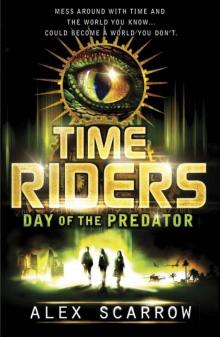 Day of the Predator
Day of the Predator Ellie Quin Book 3: Beneath the Neon Sky
Ellie Quin Book 3: Beneath the Neon Sky The Mayan Prophecy
The Mayan Prophecy October Skies
October Skies Ellie Quin Episode 4: Ellie Quin in WonderLand (The Ellie Quin Series)
Ellie Quin Episode 4: Ellie Quin in WonderLand (The Ellie Quin Series)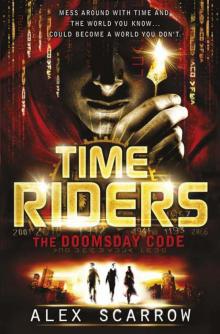 Time Riders
Time Riders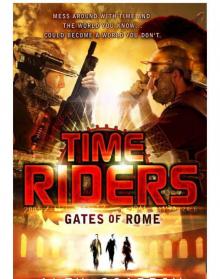 Gates of Rome
Gates of Rome Reborn
Reborn City of Shadows
City of Shadows Ellie Quin Book 2: The World According to Ellie Quin (The Ellie Quin Series)
Ellie Quin Book 2: The World According to Ellie Quin (The Ellie Quin Series) Ellie Quin Episode 5: A Girl Reborn
Ellie Quin Episode 5: A Girl Reborn Spore
Spore The Eternal War
The Eternal War Last Light
Last Light Remade
Remade Ellie Quin Book 2: The World According to Ellie Quin
Ellie Quin Book 2: The World According to Ellie Quin Ellie Quin Book 3: Beneath the Neon Sky (The Ellie Quin Series)
Ellie Quin Book 3: Beneath the Neon Sky (The Ellie Quin Series)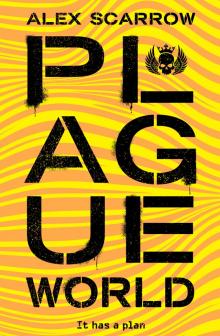 Plague World
Plague World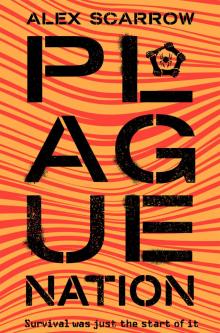 Plague Nation
Plague Nation Ellie Quin Book 01: The Legend of Ellie Quin
Ellie Quin Book 01: The Legend of Ellie Quin Ellie Quin - 04 - Ellie Quin in WonderLand
Ellie Quin - 04 - Ellie Quin in WonderLand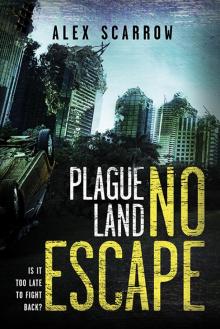 No Escape
No Escape TimeRiders
TimeRiders A Thousand Suns
A Thousand Suns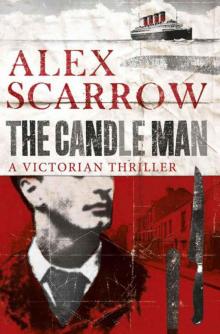 The Candle Man
The Candle Man The Pirate Kings
The Pirate Kings Burning Truth: An Edge-0f-The-Seat British Crime Thriller (DCI BOYD CRIME THRILLERS Book3) (DCI BOYD CRIME SERIES)
Burning Truth: An Edge-0f-The-Seat British Crime Thriller (DCI BOYD CRIME THRILLERS Book3) (DCI BOYD CRIME SERIES)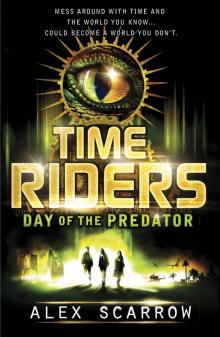 Day of the Predator tr-2
Day of the Predator tr-2 City of Shadows tr-6
City of Shadows tr-6 TimeRiders: The Infinity Cage (book 9)
TimeRiders: The Infinity Cage (book 9) The mayan prophecy (Timeriders # 8)
The mayan prophecy (Timeriders # 8)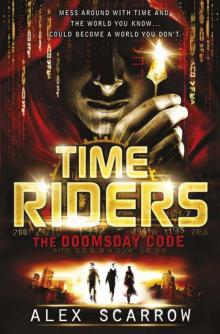 TimeRiders: The Doomsday Code (Book 3)
TimeRiders: The Doomsday Code (Book 3)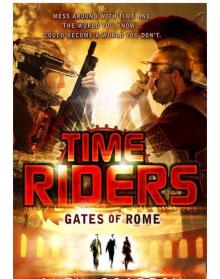 Gates of Rome tr-5
Gates of Rome tr-5 TimeRiders: The Pirate Kings (Book 7)
TimeRiders: The Pirate Kings (Book 7) TimeRiders: The Mayan Prophecy (Book 8)
TimeRiders: The Mayan Prophecy (Book 8)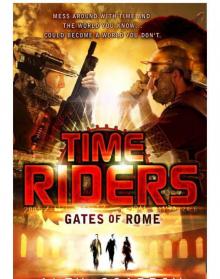 TimeRiders 05 - Gates of Rome
TimeRiders 05 - Gates of Rome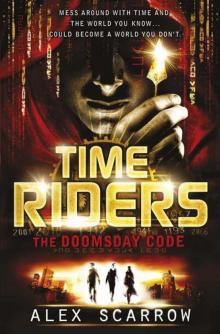 The Doomsday Code tr-3
The Doomsday Code tr-3 The Eternal War tr-4
The Eternal War tr-4 TimeRiders: City of Shadows (Book 6)
TimeRiders: City of Shadows (Book 6) Time Riders tr-1
Time Riders tr-1 Afterlight
Afterlight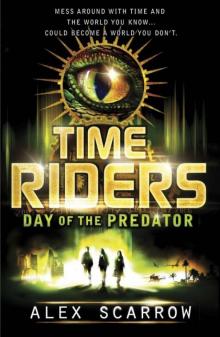 TimeRiders, Day of the Predator
TimeRiders, Day of the Predator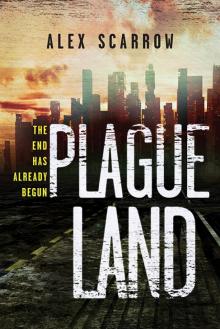 Plague Land Series, Book 1
Plague Land Series, Book 1